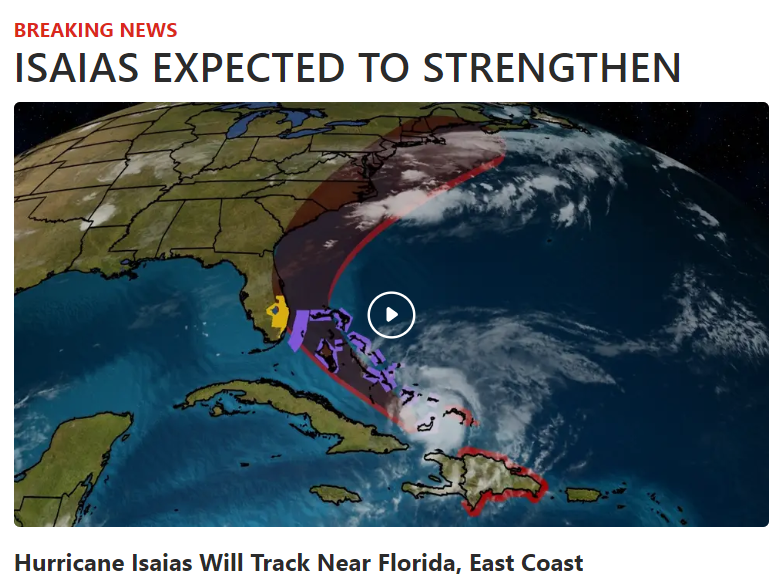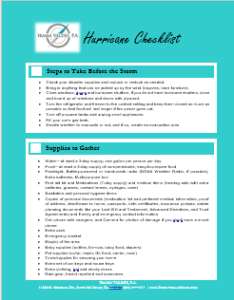Yay for Hurricane Month!
–Said nobody ever (except maybe public adjusters and hardware stores)
Last August, we went into detail as to why an estate plan should be a part of your hurricane preparedness plan. Check out the post HERE. More importantly, we discussed WHY it’s important to make sure you have your legal documents in place like:
- Avoiding the destruction of relationships between family members
- Having the ability to make decisions for an incapacitated relative without the need for Court intervention
- Preserving your assets and estate
- Avoiding attorneys fees and additional costs
- Making sure the right person is in charge
This year, we are going into a bit more detail and delving into Trust planning. So really, the title of this blog entry should have been “Why Having A Trust Should Be A Part of Your Hurricane Preparedness Plan.”
What is a Trust?
A trust is a fiduciary arrangement that allows a third party, or trustee, to hold assets on behalf of a beneficiary or beneficiaries. Trusts can be arranged in many ways and can specify exactly how and when the assets pass to the beneficiaries. More importantly when considering natural disasters (or worldwide pandemics) is that Trusts, when properly drafted and funded, can avoid the need for court-intervention or permission to be able to manage your assets in the event of incapacity and death.
Why is this important?
There are three things I value most (and I’d venture to say many humans value these or some combination thereof):
-
- Family
- Time
- Money
My family means more to me than anything in the world, and naturally, time with them is equally as important. And money, well it makes the world go round, right? Now, don’t get me wrong… I have zero aspirations of being celebrity-level-rich , but I do appreciate having a modest home, being able to spoil my now-5-year-old with his beloved LEGO sets, and knowing that if, god-forbid, one of my parents can no longer care for themselves, that I will be able to afford both of their long-term-care needs.
Having a well-drafted and properly funded Trust can ensure that what’s most important in my life is preserved while I’m alive and after I pass. How so? Read on…
Trusts Avoid Probate.
When you create a Trust, anything that’s already titled in the name of the Trust (like a checking account or real property), or anything that names the Trust as a beneficiary (like a Life Insurance Policy or a Payable-On-Death-Designation on a savings account), can be managed by the Trust without the need for a Court Order in a Probate case. So this means that as soon as I pass away, funds will be available IMMEDIATELY for the benefit of my son (or parents) without having to ask permission of a Judge nor wait MONTHS until an order is entered allowing certain expenses to be paid. Probate is the legal process that is needed to make sure property and possessions are distributed to the deceased person’s beneficiaries.The property and possessions that must go through probate are those that in your name alone, property that doesn’t have a specific owner (think personal items), or assets that are held jointly with someone but have no survivorship provisions (i.e., two people own a business and there is no succession agreement).
Probate Costs Money.
According to thebalance.com, “The overall cost of probate can vary depending on the type and the value of the estate’s property. In general, the greater the value, the more probate will cost. You can probably count on your estate paying anywhere from 4% to 7%, or even more in some isolated cases.” There are different fees and costs associated with probate, like:
-
- Court Fees (Fees assessed by the Court to file a Probate Case)
- Personal Representative’s Fees (The person in charge of the probate case can request fees for doing this job)
- Attorneys Fees (The Personal Representative must be represented by counsel and unless it’s a pro bono case, there will be fees in the thousands)
- Accounting Fees and Possibly Taxes (Some estates require estate tax returns to be prepared)
- Appraisals and Business Valuation Fees (When assets are being sold or liquidated, the Court may require appraisals and/or valuations to be performed to make sure the assets are being sold for a fair and reasonable amount)
- Miscellaneous Fees (Think: homeowner’s insurance, storage costs, shipping, publication in papers, etc).
The Court Has Control in Probate (and Guardianship).
Without a Trust, the management and distribution of your assets will need to be approved by a Court of competent jurisdiction (i.e., usually where you reside or where an asset is located). In addition to this, if any of your beneficiaries are minors, then a guardianship may be necessary to hold and manage their assets until they become of-age (here in Florida, that’s 18 years old). Any expenses that need to be paid from those funds, must be approved by the Court, which means the people that are caring for your minor children must be represented by an attorney and have to pay that attorney to get an order each time an expense for your child needs to be paid. I don’t know you about you, but raising someone else’s child is hard enough as it is… add to that the extra stress, delay, and cost of dealing with the Court, and it’s the perfect chaotic storm.
Back to the topic at hand… when a hurricane comes, make sure you have your estate plan in place to make sure you and your family are well-equipped to handle anything that could happen.
Click below to download our Hurricane Checklist!
We hope all our friends, family, and clients stay safe during this hurricane. Here are some helpful links:
National Hurricane Center: https://www.nhc.noaa.gov/
AccuWeather: https://www.accuweather.com/en/hurricane/tracker










